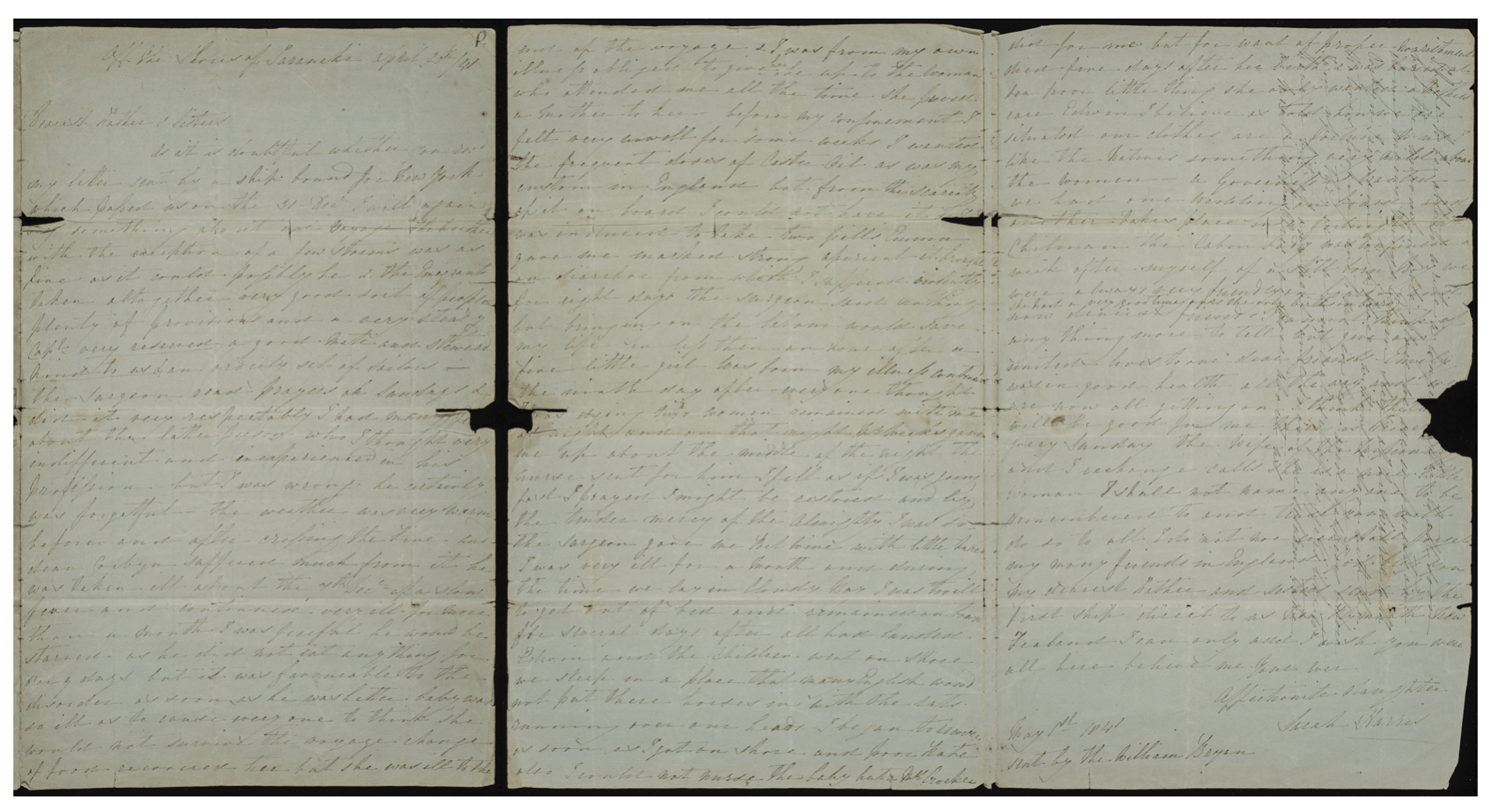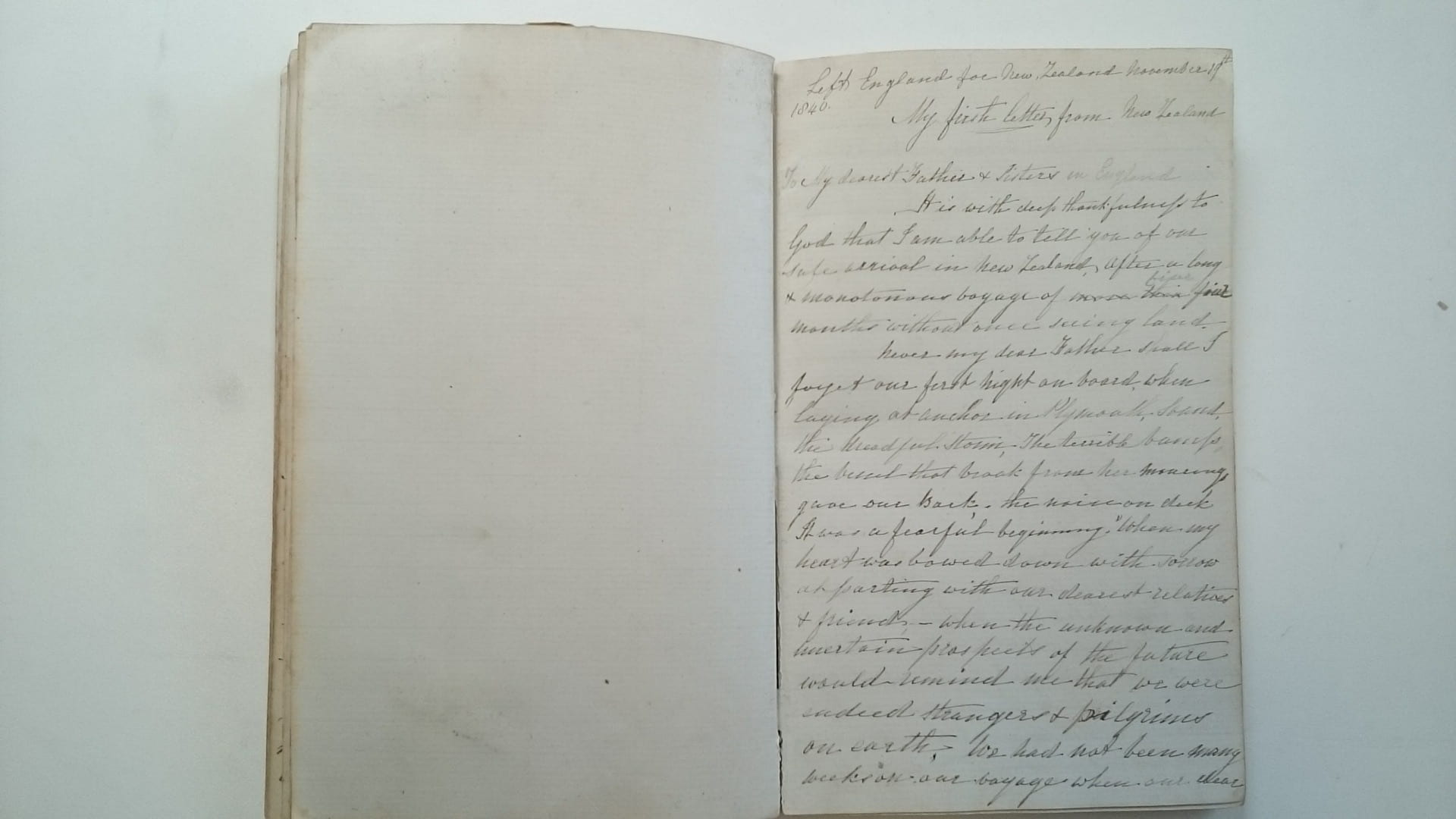By Michele Leggott

The Turnbull Typings
It is like looking at ghosts. The Alexander Turnbull Library holds typed copies of four letters written by Sarah Harris in New Plymouth to her father and sisters in England 1841 and 1843. Thanks to an accompanying note dated 1922, we know more or less how the copies came to Wellington and when. Sarah’s niece Mary Mountjoy Paddon tells the story as she prepares to send the typings to New Zealand:
As far as I can remember re Harris, Mrs Harris was a sister of my mother, daughters of Mr Hill of Plymouth Devon. He, Mr H I believe was an artist but went out to N.Z. for some Company, and as the letters state landed in New Plymouth. I had scores & scores of letters from the family which were addressed to a sister of Mrs Harris, Miss Emma Jane Hill, Liskeard, Cornwall, England. After her death they were sent to my mother Mrs Paddon, 10 Horbury Crescent, Notting Hill, London but when our house was given up shortly before my mother’s death, I had to destroy all superfluous papers etc. and for a time I corresponded with one of the daughters, I think Emily, the eldest.
Clearly some of the important letters from New Zealand were preserved or copied, or Mary Paddon would not have been able to commission the typings now at Turnbull and send them to her good friends Miss Mary Gertrude Pullen and Mrs Beatrice Marguerite (Daisy) Fabling. It was Daisy Fabling who deposited the typings with Turnbull in 1976 after the death of Mary Pullen. So the family trace is present but it is obscured by the travels of the four copied letters, whose originals would seem to have disappeared.

Typings and an original letter at Puke Ariki
But not quite. Luckily for us, Sarah’s first letter from New Plymouth, dated 20 April 1841 and sent to England by the returning emigrant ship William Bryan, is part of the Harris collection at Puke Ariki Museum in New Plymouth. And so it is possible to compare the original letter with the 1922 typing and see that the copyist, though fairly accurate, has made the usual small departures from the letter in Sarah’s own hand. And if one typing is full of variants, we can assume the other three are similarly drifting away from whatever they were being copied from. They are ghosts of an original text. And if someone (Mary Paddon?) has returned Sarah’s April 1841 letter to the family, is her 1922 typist copying from a copy retained in England? Just how ghostly are these copies and should we trust them at all?
Well, yes. The collection at Puke Ariki holds, besides Sarah’s one original letter, five typings of other letters 1841-52, one recognisable from Turnbull, the others not. Who is typing these letters and should we trust them as a true record of Sarah’s disappeared originals? We have here five typings (ghosts) and just the one letter in Sarah’s hand. The ghosts sound like her, are consistent with what we know of the Hill family in Plymouth and Liskeard. But what sources are the Puke Ariki typists using that have not travelled into the collection?

Fast forward to February 2018. Godfrey Briant and wife Judith have discovered a notebook belonging to Godfrey’s great-great-grandmother Sarah Harris written in 1871. It contains a memoir that begins:
A brief account of my life for my dear children.
I have little of the merry days of childhood to record which were as happy as health, & the care of fond parents could make them. At the age of twelve the first great sorrow came to us in the bereavement of my dear Mother & two older sisters, my Grandfather & two Grandmothers within five years. I can well remember the delight we felt when the first white frock with a broad sash of black ribbon tied behind was put on after being so many years in mourning.
The notebook chronicles family history up to and beyond emigration to New Zealand and includes lists of English family connections as well as information about Sarah’s eight children. It is without doubt the account Emily Harris mentions at the outset of her 1885 diary:
Colonel Branfill told us the other evening that he had been spending his evenings lately in going over his diary. He wanted to write a short life of an uncle of his. He says he does not see why people who in private life have done their duty, have been of use to their friends or have been remarkable in their lives in any way should not have their lives written, not for the public but for their friends & relatives. We told him that our mother had kept a book in which she had written down all she could recall from her father’s family. I am sure that most people in the Colonies should do the same, or how in a few years are their children to know anything about their English relatives if they have any.
Looking through Sarah’s notebook we found that she had also copied five letters to her family in England 1841-52. The mystery of the Puke Ariki typings was solved: someone had been making copies of Sarah’s copies. Four of the Puke Ariki letters had a manuscript source in Sarah’s hand in the notebook, and there is one more the typist had found too faint to copy. The family’s own archive has produced a secure source for the Harris letters at Puke Ariki. We were very happy with the new provenance and it took some time to ask an obvious question.
How was Sarah Harris able to copy her letters 1841-52 into the notebook of 1871? It seems unlikely that she would have kept copies of her own, and as best we know the letters were with her sister Emma Hill in Liskeard, Cornwall until Emma’s death in 1866, when they were handed on to younger sister Ann Paddon in London. There is only one reasonable solution to the question. Sarah is copying her letters from originals that must have been sent to New Zealand after Emma’s death 24 October 1866, a date that is recorded in the notebook, where Sarah makes plain more than once the closeness of the bond between herself and her older sister. The ‘scores & scores’ of letters collected 1841-1866 were certainly sent to Ann at 10 Horbury St, Notting Hill. But it would seem that a selection was also sent to Sarah in Nelson. Only one of them, the very first, has survived its travel to and from England, but its existence, and its place in the family collection at Puke Ariki, points to the others.
Who knows how many of her letters were returned to Sarah after 1866 and before 1871? The thirty-year anniversary of the family’s arrival in New Zealand is perhaps one starting point for Sarah’s notebook. Another may have been the time it takes to grieve for a sister whose faithful collecting of letters has now delivered some of them into your hands again. Sarah Harris unfolds a letter, opens her notebook and begins to write:
Left England for New Zealand November 19th 1840.
My first letter from New Zealand
To My dearest Father & Sisters in England
It is with deep thankfulness to God that I am able to tell you of our safe arrival in New Zealand, after a long & monotonous voyage of more than four months without once seeing land.
Never my dear Father shall I forget our first night on board, when laying at anchor in Plymouth Sound, the dreadful storm, the terrible bump the vessel that broke from the moorings gave our back, the noise on deck. It was a fearful beginning. When my heart was bowed down with sorrow on parting with our dearest relatives & friends – when the unknown and uncertain prospects of the future would remind me that we were indeed strangers & pilgrims on earth.
